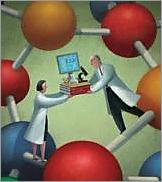
A report from the NBC affiliate in Boston sheds light on an aspect of mail-in DNA kits that may surprise some users: when you sign the paperwork to obtain the results, you're often granting a "perpetual, royalty-free, world-wide, transferable license" for the data. The company in this example is Ancestry, but in an interview Glenn Cohen of Harvard Law School's Petrie-Flom Center noted "that kind of language is probably buried into the informed consent or the forms you sign almost every time you've donated blood or had a blood test." In a statement, Ancestry said they will "not share DNA data with third party marketers, employers or insurance companies," and they allow users to delete their DNA results and/or ask the company destroy the sample from which the results were derived. They also store your DNA without your name. However, these policies are not included in the contract users of Ancestry DNA are required to sign. Consumer protection attorney Joel Winston is quoted in Slate saying “Even if you’ve never used Ancestry.com, but one of your genetic relatives has, the company may already own identifiable portions of your DNA.” Issues related to shared family genomics and privacy have been explored by Consortium Chair Susan M. Wolf and her co-investigators, resulting in a major symposium on the subject.